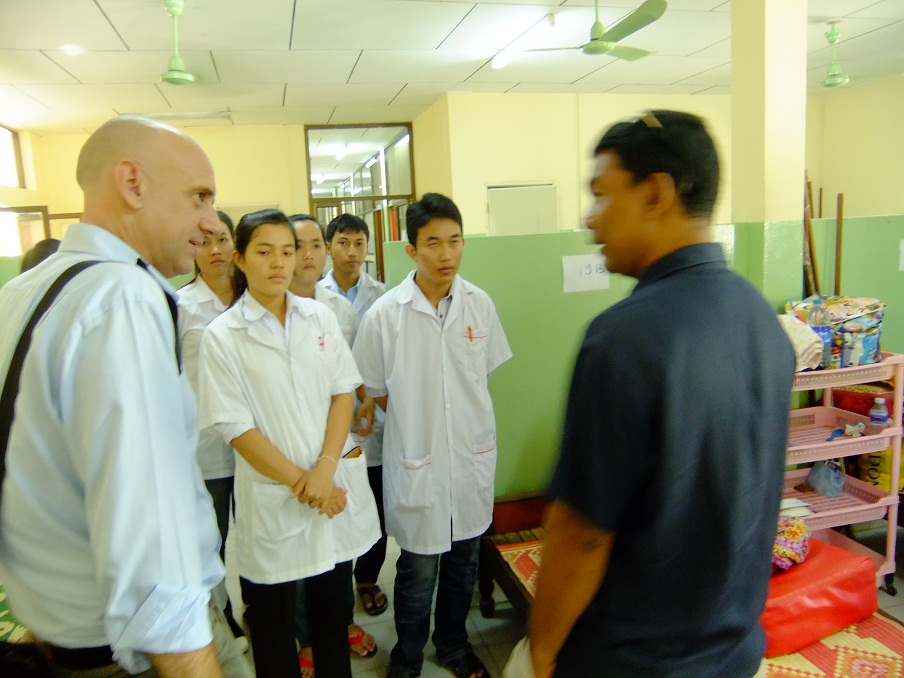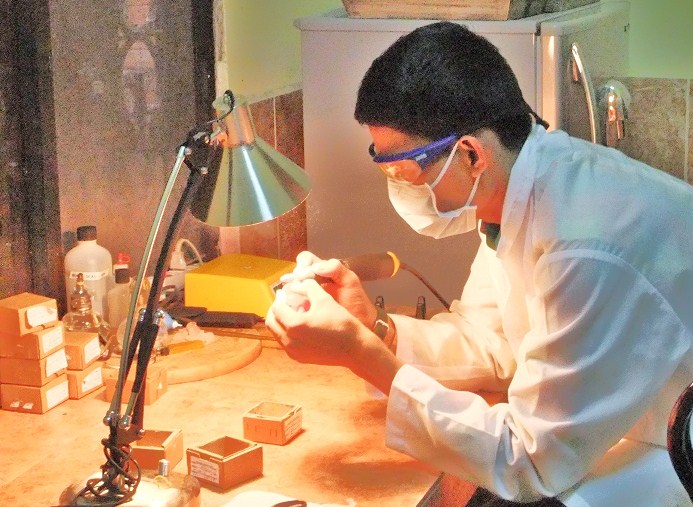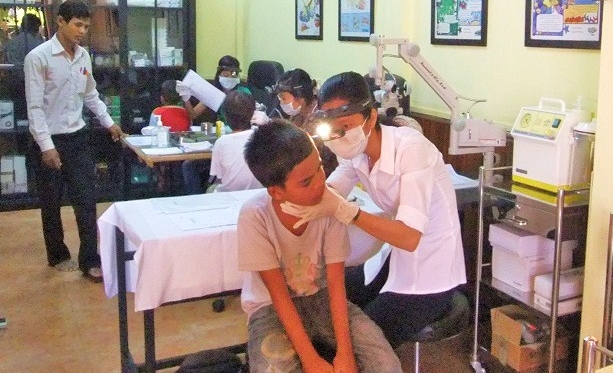An interview with Glyn Vaughan, the founder of All Ears Cambodia02.11.2012
 An interview with...
An interview with...Glyn Vaughan, Founder of All Ears Cambodia (AEC), the only ear and hearing clinic in Cambodia.
Former audiologist Glyn Vaughan left busy London to start up Cambodia's only ear and hearing clinic. In a country where the price of a hearing aid was more than what the average Cambodian would pay for his house, AEC's refurbishing of old hearing aids, among other projects, is credibly important
Trained in Britain as an audiologist, you left to do voluntary work all around the world. Why did you decide to leave it all behind?
I became tired of armchair philosophy and decided that if I am to leave some kind of mark on this planet it should be one worthwhile. Chase your dreams because no one else will.
How and when did you end up in Cambodia?
When I first visited Phnom Penh in 1998, the sum total of audiological practice was an old, rusty tuning fork at Preah Ang Duong Hospital. That was the collective capability of audiological assessment for the entire country! Actually, that's not true. At the Khmer-Soviet Friendship Hospital there is a gadget (still in use), complete with chair and arm straps, assembled probably in pre-Stalinist Russia; one imagines circa 1925. It resembles the Orgasmotron in the '60s film Barbarella and is alleged by the sawbones in the ENT Dept to cure practically anything.
In the late nineties I was only a visiting lecturer at Ang Duong (the National Eye and ENT Hospital) and the University of Health Sciences. In those days they were doing mastoid surgery with a hammer and chisel. I moved permanently to Phnom Penh at the end of 2002.
What inspired you to dedicate yourself to helping Cambodians with ear and hearing difficulties?
I was actually trying to get into Laos. The initial idea was to run three programmes out of one country. As it turned out, neighbouring Cambodia proved easier to become operational. I am still loosely involved in the programmes in the other two countries – Lao PDR and Bhutan up in the Himalayas.
How do your friends and family feel about you living in Cambodia?
I suspect they're deliriously happy and definitely more affluent - they lend less money these days.
The price of a modern hearing aid is more than a Cambodian worker would pay for his house, to quote your website. How do you solve this problem to provide hearing aids to so many Cambodians?
We created a hearing aid recycling programme and have an on-site repair service. We fix hearing aids and refurbish them. Those we are unable to repair we salvage the working parts and use them to build new ones.
You mention on your website that old superstitious remedies for ear problems, such as pouring petrol in an ear, are still a persistent problem. How accepting have local Cambodians been to modern ear care at All Ears Cambodia?
 Sadly, an apothecaries’ weight of hocus pocus can still be had in Cambodia. Most Khmers live simple lives in scattered villages. At outreach, the most basic education in healthcare often brings about the most significant change. The indigenous health cosmologists seek out the khmer kru; others pay visit to the 'injection doctors'. Some look to old superstitions. Troubled ears are jabbed with chicken quills or packed with betel and millipede juice. Some have petrol poured in them. Injured ears are frequently made worse and sometimes damaged irreparably.
Sadly, an apothecaries’ weight of hocus pocus can still be had in Cambodia. Most Khmers live simple lives in scattered villages. At outreach, the most basic education in healthcare often brings about the most significant change. The indigenous health cosmologists seek out the khmer kru; others pay visit to the 'injection doctors'. Some look to old superstitions. Troubled ears are jabbed with chicken quills or packed with betel and millipede juice. Some have petrol poured in them. Injured ears are frequently made worse and sometimes damaged irreparably.I recall a case history where a mother had been so exasperated by the foul-smelling pus discharging from her daughter's ears that she had sealed them off with Super Glue.
The All Ears team is well aware of the measures that some villagers take and that intrinsically, prevention of ear problems begins with knowledge. The service being regarded within the community as a community programme, that is readily available and easily accessible is important. Ownership at the local level is vital. The other day I received word from Prey Tralach – from our clinic in the Cardamom Mountains. It serves 15,000 people with barely any access to health care – formerly under the Khmer Rouge, they've been neglected in the years since the civil war. Half of the 15,000 are children and word came about one of them - a ten year-old girl whose infant brother had been up all night crying with ear pain. Sophy, the girl, turned up at the clinic the next day and asked for help – she'd walked 15 miles with her brother on her back. It turned out he had an acute infection and our team dealt with it and patched him up - and Sophy carried him the 15 miles back.
Sophy's deed speaks volumes about ownership; of need and acceptance; of direct action and the sheer will to stand up for the basic human right of good health care,
You focus a lot on education for student clinicians. In a country which has had so little experience with ear health care, how receptive have students been?
Enormously receptive – when taking on new students, I specifically look for people born on the wrong side of the tracks; ones living in abject poverty who just need a break in life. I'm not interested in the university graduates – to get into university in Cambodia you must be fairly well-heeled. Those guys already have their opportunity. I'm more interested in people with a good heart, an empathy with the poor and a real willingness to help others. If the will is there you can teach them almost anything – the knowledge will come. Give them the chance and watch them fly.
As the director and a medical professional, how do you handle the challenges and demands of the medical work of AEC, as well as the administrative and financial requirements to keep donors happy?
It's not easy – director, administrator, clinician, teacher, writer, publicist, fundraiser, procurements officer, would-be accountant – I seem to spend my days plate spinning two-dozen tasks simultaneously.
How have AfID volunteers helped in addressing these challenges? How can they continue to benefit All Ears Cambodia?
Working with the volunteers from AfID has always been enjoyable. It’s been a delight to have them with us. The margin between our standard of clinical delivery and our acumen for accountancy was evident from the beginning. Their capacity to improve and professionalise our approach to accountancy has been second to none. Their ability to improvise, to teach and convey difficult concepts in simple ways and their insight and technical expertise has been outstanding.
I’d like to say thank you to Steven, Cynthia, Aaron and Stuart and all the good folk of AfID who have worked in the wings (Neil, Anna, Aimee, Katie et al.) on behalf of the team and all the adults and children who benefit from the work of All Ears Cambodia. I couldn’t have wished for more. The support has been fantastic.
In my line of work the highest level of achievement for an aid organisation is its own obsolescence. For a given project, I guess the AfiD volunteer's objective is similar - to work oneself out of a job. To create a situation where one is no longer required as the AfID partner gains the confidence to work independently and up to the standards necessary. I was just thinking how nice it would be if intentionally, I was to remain eternally ignorant about all things fiscal and numerical so that we’d have to have you guys around for the foreseeable future.
What is the most rewarding part of your job?
Meeting the kids we fitted with hearing aids six or seven years ago and who are now able to speak; many in mainstream schools knocking their peers for six.
Lastly, All Ears Cambodia has a number of projects, from working with the deaf community to running special outreach clinics. What’s next for AEC?
AEC pushes on. The sketch plan for the future is: (1) to develop human resources and expand clinical services; (2) to build private clinic capacity to further generate income for AEC projects; (3) to commence start-up activities for All Ears International – it aims to attain UK charitable status by mid-2011. Investigations to identify suitable partner countries are underway. All Ears Cambodia is currently preparing an exchange visit with counterparts in North Korea and will federate with AEI; and (4) to establish a Centre of Excellence, an accredited primary ear care and audiology training school for Khmer nationals and health workers from other developing countries - a school for developing world health workers run by developing world health workers.
No small task, hey?


